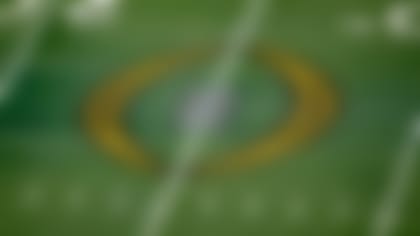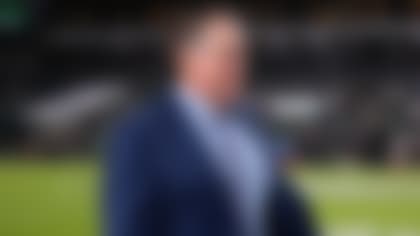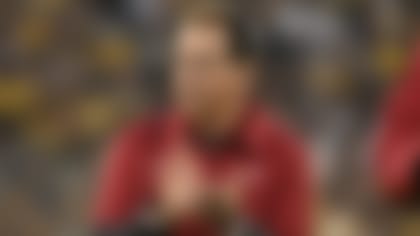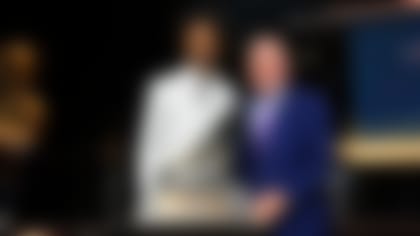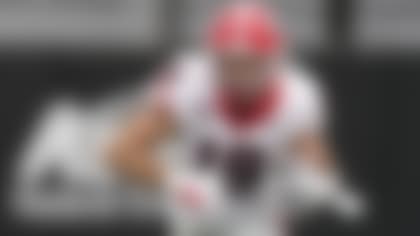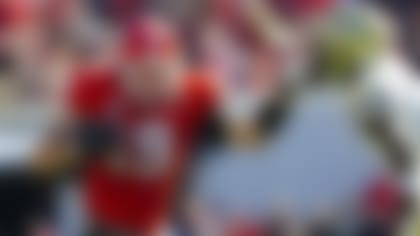It takes three full years to evaluate a draft class, so it's time to take a long, hard look at the 2011 NFL Draft. Of course, various situations and circumstances greatly affected the impact several players made on their respective teams, but excuses don't matter when it comes time to look at performance and production. With that in mind, here's my review of the 2011 draft:
[
Arizona Cardinals
The Cardinals entered the draft hoping to add a few explosive playmakers on both sides of the ball. Patrick Peterson was regarded as the most dynamic athlete in the draft, with the potential to impact the game as a returner and cover corner. He has lived up to the hype with multiple Pro Bowl bids as a corner/returner. Ryan Williams flashed big-time potential at Virginia Tech, but failed to carve out a steady role with the Cardinals following his injury. Sam Acho provided some production as a situational pass rusher/spot starter in the Cardinals' aggressive scheme.
Best pick:Patrick Peterson, CB (Round 1, 5th overall)
Peterson has quickly emerged as one of the top cover corners in the NFL. He has notched back-to-back Pro Bowl berths at cornerback, showcasing exceptional ball skills and athleticism. Additionally, Peterson is a dynamic playmaker capable of delivering big plays in the kicking game or on gadget plays as a selective offensive weapon. Given his impact as a two-phase player, the Cardinals have to be pleased with the return on investment from Peterson.
Worst pick:Ryan Williams, RB (Round 2, 38th overall)
Williams was expected to bolster the Cardinals' ground game, but injuries derailed his career before he could become a viable workhorse for the team. Williams mustered just 164 rushing yards on 58 attempts during his tenure with the club, which is not the kind of production expected from a top pick.
Value pick:Rob Housler, TE (Round 3, 69th overall)
As a third-round pick with modest expectations, Housler has been a solid contributor for the Cardinals with 96 receptions for 1,004 yards in 21 career starts. Although he isn't a front-line playmaker, he has been a serviceable weapon in a passing game built around the receivers on the perimeter.
Grade: B
[
Atlanta Falcons
Falcons GM Thomas Dimitroff made a gutsy move on draft day to land Julio Jones with the sixth overall pick. The savvy decision-maker surrendered five picks to the Cleveland Browns to move up from the 27th pick to give Matt Ryan a big-time playmaker on the outside. Although the Browns' mismanagement of those picks ultimately made the Falcons the winner of the deal, the move was certainly controversial at the time.
Best pick:Julio Jones, WR (Round 1, 6th overall)
Jones has definitely lived up to the hype as the Falcons' designated big-play threat. The 6-foot-3, 220-pound playmaker has totaled 15 receptions of 40-plus yards and 20 touchdowns in 34 games. With a career average of 15.7 yards per catch, Jones is a big play waiting to happen in Atlanta.
Worst pick:Andrew Jackson, G (Round 7, 210th overall)
It's unfair to put a seventh-round pick on the list because teams count those selections as glorified free agents, but Jackson gets the nod since he failed to earn a long-lasting spot on the Falcons' 53-man roster.
Value pick:Jacquizz Rodgers, RB (Round 5, 145th overall)
The Falcons desperately needed a change-of-pace back to add some sizzle to the passing game. Rodgers has certainly made an impact as a receiver out of the backfield with 126 receptions over the past three seasons, including 52 grabs for 341 yards and two scores in 2013.
Grade: B+
[
Baltimore Ravens
The Ravens have a reputation for consistently knocking it out of the park on draft day. In 2011, GM Ozzie Newsome landed another solid class with five key contributors (Jimmy Smith, Torrey Smith, Pernell McPhee, Jah Reid and Tyrod Taylor) emerging from the eight-man class. More importantly, the Ravens landed some complementary players that helped the team win Super Bowl XLVII.
Best pick:Jimmy Smith, CB (Round 1, 27th overall)
Smith has quietly developed into an upper-echelon cover corner in the AFC. Sure, it took him a little while to find his groove as a player, but it's hard to find big, athletic corners with his skills. With Smith coming off a solid season (58 tackles, 2 interceptions and 15 passes defensed), the Ravens should be pleased with the progress of their former first-round pick.
Worst pick:Tandon Doss, WR (Round 4, 123rd overall)
Doss failed to carve out a niche with the Ravens as a third or fourth receiver. He finished his Ravens career with just 26 receptions, but failed to make a significant contribution to the team outside of the kicking game.
Value pick:Torrey Smith, WR (Round 2, 58th overall)
The argument could be waged that Smith has been the best pick of the class, but landing a Pro Bowl-caliber receiver in the second round is an excellent bargain for the Ravens. Smith has been a steady producer on the perimeter, averaging 17.2 yards per catch throughout his career with 19 touchdowns. Factor in his progress as a No. 1 receiver, and Smith is a tremendous value for the team.
Grade: A-
[
Buffalo Bills
The Bills have endured a long playoff drought, but the 2011 class is playing a major role in the turnaround that's set to take place under coach Doug Marrone. Marcell Dareus has become a disruptive force in the middle, while Aaron Williams and Da'Norris Searcy have taken care of business in the backend. Kelvin Sheppard was a solid contributor for the Bills, but he was traded away prior to the 2013 season for Jerry Hughes. Although the move is an acknowledgment of failure, the fact that Hughes made significant contributions as a situational pass rusher means the move worked out well for the Bills.
Best pick:Aaron Williams, DB (Round 2, 34th overall)
Williams made a smooth conversion from cornerback to safety for the Bills. He is athletic enough to lock down slot receivers and tight ends, yet is a forceful presence against the run. With a move to free safety on the horizon and signed to a $26 million extension, Williams has exceeded expectations as a Day 2 selection.
Worst pick:Marcell Dareus, DT (Round 1, 3rd overall)
There's no disputing Dareus' on-field performance (18.5 sacks in three seasons), but his legal transgressions will make it tough for the team to commit big money to a player with a suspect background. Thus, the Bills could eventually regret investing so much in a player that might not be around for the long-term.
Value pick:Da'Norris Searcy, SS (Round 4, 100th overall)
Searcy's versatility and playmaking skills have made him a valuable member of the Bills' secondary. He capably covers the deep middle, while also flashing the toughness and athleticism to rush the passer on blitzes (3.5 sacks in 2013). With 10 starts in three seasons and an emerging role as a sub-linebacker, the Bills have gotten good value from their fourth-round pick.
Grade: B
[
Carolina Panthers
When teams miss on early draft selections, it typically coincides with dismal results on the field. The Panthers certainly can attest to that fact after watching the team struggle for years despite the best efforts of their sensational quarterback, Cam Newton. The former No. 1 overall pick has grown immensely has a player and leader in Carolina, while single-handedly carrying an offense that lacked legitimate weapons outside of Steve Smith and Greg Olsen. Although he received little assistance from his draft mates, the Panthers' rise in the NFC is tied to the growth of their franchise quarterback.
Best pick:Cam Newton, QB (Round 1, 1st overall)
Newton silenced the doubters about his passing prowess by becoming the first rookie to surpass the 4,000-yard mark. Additionally, he broke Steve Grogan's long-time record for rushing touchdowns by a quarterback (14) and became the first rookie to rush for at least 700 yards. Although he experienced a bit of a sophomore slump, Newton's re-emergence as the NFL's most explosive offensive weapon keyed the Panthers' playoff run a season ago.
Worst pick:Terrell McClain, DT (Round 3, 65th overall)
The Panthers' third-round pick only lasted a season before hitting the waiver wire. The South Florida product never developed into the disruptive force team officials expected, which is why he was ushered out of the building during the final cuts prior to the 2012 season.
Value pick:Kealoha Pilares, WR (Round 5, 132nd overall)
I probably should leave this spot blank, but Pilares' presence on the roster makes him noteworthy based on the dismal results of the class. Although he has made minimal contributions as a backup/special-teams member, he is entering his fourth season with the team.
Grade: D
[
Chicago Bears
I wish that I could sugar coat it, but the Bears had an awful draft in 2011. The team misevaluated Gabe Carimi's talent and potential, and failed to land an impact player in the subsequent rounds. Although most teams don't expect down-the-line selections to become Pro Bowlers, the fact that the Bears were unable to land any noteworthy contributors speaks volumes about their epic draft-day failures.
Best pick:Stephen Paea, DT (Round 2, 53rd overall)
I should probably leave this category blank, but Paea could qualify as the best member of the class. The fourth-year pro has started 24 games over the past two seasons and developed into a solid plugger at the point of attack. It's unlikely that he will develop into a difference maker on the interior, but he should be a fixture in the Bears' defense for a long time.
Worst pick:Gabe Carimi, OT (Round 1, 29th overall)
The Bears desperately needed to upgrade their offensive line after watching their quarterback routinely take a pounding in the pocket. Carimi was expected to solve the problem, but he proved to be a turnstile at the position, leading to a trade to the Buccaneers during the 2013 offseason.
Value pick:Chris Conte, S (Round, 93rd overall)
Bears fans might cringe at the sight of Conte on the list, but the guy has started 40 games during his tenure and produced six interceptions as a deep middle defender. Sure, he has struggled in coverage at times, but he has been the best safety on the roster the past two seasons.
Grade: F
[
Cincinnati Bengals
Marvin Lewis has transformed the Bengals into perennial playoff contenders by nabbing blue-chip prospects throughout the draft over the past five years. In 2011, Lewis nailed it with the selections of A.J. Green and Andy Dalton in back-to-back rounds. The lethal passing combination has given the Bengals an explosive offensive identity. More important, it has helped the Bengals secure three straight playoff berths in the rugged AFC North. With Clint Boling also emerging as a starter, the Bengals assembled a solid foundation of talent in the draft.
Best pick:A.J. Green, WR (Round 1, 3rd overall)
Players selected within the top five picks are expected to become elite playmakers at their respective positions quickly in their careers. Green has played up to that lofty standard by posting three consecutive 1,000-yard seasons and scoring 29 touchdowns to start his career. Additionally, he has 23 receptions of 40-plus yards and firmly cemented his reputation as one of the most explosive receivers in the NFL.
Worst pick:Dontay Moch, LB (Round 3, 66th overall)
Moch failed to make a significant contribution for the Bengals despite being one of the athletic marvels at the 2011 NFL Scouting Combine (4.40 40; 42-inch vertical jump; 10-8 broad jump and 4.38 pro-agility shuttle). After spending the first season as a healthy inactive and playing sparingly as a second-year player, Moch was eventually waived by the Bengals at the end of training camp in 2013. (After spending the season with the Arizona Cardinals, Moch was waived and reclaimed by the Bengals in March).
Value pick:Andy Dalton, QB (Round 2, 35th overall)
It's rare to land a potential franchise quarterback outside of the first round, but Dalton has been a pleasant surprise for the Bengals. Dalton has surpassed the 3,000-yard mark in each of his three seasons, including a 4,293-yard effort that included a 33:20 touchdown-to-interception ratio. Although he needs to deliver a playoff win to cement his status as a franchise quarterback, it's hard to criticize a signal-caller with three consecutive playoff appearances to start his career.
Grade: A
Cleveland Browns
The Browns came away with a wealth of picks from a blockbuster trade with the Atlanta Falcons, but converting those selections into viable contributors proved to be challenging for the team. Phil Taylor is the only player remaining on the roster from the additional picks. While he has been a stud on the interior, the inability to identify a franchise quarterback (Brandon Weeden) or a legitimate playmaker (Greg Little) rendered the team punchless against AFC North competition. With those failures in mind, it's hard to give the Browns a high grade despite the identification of a few hidden gems in the draft.
Best pick:Jordan Cameron, TE (Round 4, 102nd overall)
The former collegiate basketball player has blossomed into an elite tight end for the Browns. Cameron snagged 80 receptions for 917 yards and seven scores, while proving a difficult matchup for linebackers and safeties in coverage. With a game that's quickly rounding into Pro Bowl form, Cameron is unquestionably one of the best picks the Browns have made in some time.
Worst pick:Greg Little, WR (Round 2, 59th overall)
Little posted solid numbers as a starter for the Browns (155 receptions for 1,821 yards and eight touchdowns), but his struggles with drops and overall inconsistency fell short of what Browns officials expected from a No. 2 receiver.
Value pick:Buster Skrine, DB (Round 5, 137th overall)
It's always a bonus whenever a late-round selection becomes a key contributor. That's why Skrine's success as a part-time starter/nickel corner makes him worthy of a mention on this list. The former Tennessee-Chattanooga standout has recorded 31 passes defensed and two interceptions, while logging 21 career starts in three seasons.
Grade: C+
[
Dallas Cowboys
The Cowboys have been mired in mediocrity the past few seasons, but the 2011 class certainly isn't to blame for the disappointing results at Valley Ranch. The Cowboys landed a franchise offensive tackle (Tyron Smith) and an electric runner with home-run ability (DeMarco Murray). With Dwayne Harris and Bruce Carter also contributing as role players, it's hard to knock Jerry Jones for his handling of the 2011 draft.
Best pick:Tyron Smith, OT (Round 1, 9th overall)
Smith has been a stud for the Cowboys at offensive tackle. He made a quick transition from playing on the right side to thriving at left tackle. Smith's combination of power, strength and athleticism is remarkable, which is why Jerry Jones deserves credit for his foresight.
Worst pick:David Arkin, G (Round 4, 110th overall)
Arkin spent three seasons with the Cowboys, but never appeared in a game with the team.
Value pick:DeMarco Murray, RB (Round 3, 71st overall)
Murray has shown flashes of being an elite runner when healthy. He's averaged nearly five yards a carry throughout his career, and is coming off a 1,200-yard season that showcased his explosiveness as a runner. If he can avoid the injury bug, it's possible that Murray deserves the nod as the Cowboys' best pick in the 2011 draft.
Grade: B
[
Denver Broncos
John Elway and John Fox set to remake the Broncos into a tough-minded squad with explosive playmakers on both sides of the ball. Sitting at the top of the board, the Broncos landed a difference maker in Von Miller. The speedy pass rusher has keyed a defensive resurgence in Mile High. Orlando Franklin and Julius Thomas have been pleasant surprises, with Nate Irving also chipping in as a spot player. Overall, the 2011 class has played a key role in the Broncos' recent success in the AFC.
Best pick:Von Miller, LB (Round 1, 2nd overall)
This was a lay-up selection for me based on Miller's extraordinary success as a pass rusher. The Pro Bowler has notched 35 sacks in 40 games, exhibiting rare speed and quickness off the edge. Additionally, Miller has 11 forced fumbles and an interception on the resume. With few defenders capable of rivaling that kind of production and disruption, Elway and Fox nailed it when they opted to rebuild the Broncos around Miller's spectacular talents.
Worst pick:Rahim Moore, S (Round 2, 45th overall)
This is not a slight to Moore's considerable talent, but the second-round pick has not delivered the kind of impact plays observers expected when he entered the league after a stellar career at UCLA. He has been victimized by the deep ball, including a critical Hail Mary toss in the 2013 playoffs that kept the Broncos from making a deep postseason run. Although Moore has shown signs of improvement, it's fair to say some of his draftmates have outplayed him to this point.
Value pick:Julius Thomas, TE (Round 4, 129th overall)
Thomas continued to advance the notion that former basketball players fare well between the hashes with his rapid development as a playmaker for the Broncos. The former Portland State standout scored 12 touchdowns in 2013 and flashed the potential to develop into a Pro Bowl-caliber pass catcher down the road. Given the low expectations that accompanied his arrival, Thomas is an excellent value for the Broncos at this point.
Grade: A
[
Detroit Lions
It's not a good sign when your team only has one contributing member remaining from a draft conducted only three years ago. But that's where the Lions are after watching every member of the class flame out except Nick Fairley. Injuries (Mikel Leshoure) and insubordination (Titus Young) prevented the Lions' young offensive weapons from reaching their potential, which is why the Lions' 2011 class is largely viewed as a major disappointment. With Fairley also failing to fulfill his immense potential, it's hard to give the Lions a passing mark for the efforts on draft day.
Best pick:Nick Fairley, DT (Round 1, 13th overall)
Fairley has shown flashes of the disruptive skills that made him a dominant force at Auburn, but inconsistent effort and focus keep him from playing at a Pro Bowl level. Regardless, the big, athletic defensive tackle is a handful to slow down inside, which is why he deserves top billing in the 2011 class.
Worst pick: Titus Young, WR (Round 2, 45th overall)
If not for Young's erratic behavior that led to his dismissal from the team, it's possible that he would've replaced Fairley as the crown jewel of the class. The wiry pass catcher totaled 81 receptions for 990 yards and 10 touchdowns. Those numbers are solid for a complementary playmaker, but Young's boorish behavior and blatant disrespect of teammates and coaches forced the team to cut him at the end of the 2012 season. With the Lions unable to get long-term production from their second-round pick, the Young deal has to go down as an epic failure.
Value pick: None
The Lions' inability to find a quality contributor outside of Fairley suggests that the team's draft haul didn't come close to meeting expectations.
Grade: D
[
Green Bay Packers
The Packers routinely accumulate a host of mid- to late-round picks to take chances on players with developmental potential. Although the majority of draft picks fail to pan out, the success of players like Randall Cobb and Davon House makes the approach a worthwhile gamble. Of course, the failures of Derek Sherrod (injuries) and Alex Green (performance) will bring down the Packers' overall draft grade, the "draft and develop" philosophy has yielded enough playmakers to keep the team in contention over the years.
Best pick:Randall Cobb, WR (Round 2, 64th overall)
Cobb has registered only 12 career starts, but team officials are smitten with his speed, athleticism and versatility. As an explosive all-purpose threat, Cobb has scored 16 total touchdowns (13 receiving; three kick returns) and given the Packers' offense some much-needed juice with his home-run ability.
Worst pick:Alex Green, RB (Round 3, 96th overall)
Packers GM Ted Thompson expected Green to become the team's workhorse runner, but the former Hawaii star failed to claim the job despite numerous opportunities. Sure, injuries and a crowded backfield played a role in Green's failures, but standout runners routinely shine in Mike McCarthy's system.
Value pick:Davon House, CB (Round 4, 131st overall)
House is the kind of developmental prospect that the Packers have relished over the years. After entering the league as a height-weight-speed athlete, House has shown enough potential to become a legitimate starting cornerback for the team down the road. With a solid 2013 campaign highlighting his talent and potential, House is a valuable member of a young, athletic secondary.
Grade: C
[
Houston Texans
The Texans briefly held a vice grip on the AFC South due to an explosive offense and suffocating defense bolstered the additions of several key weapons in the 2011 class. J.J. Watt took home the 2012 Defensive Player of the Year award, while T.J. Yates helped the team win a playoff game as a second-year pro. With Brooks Reed and Shiloh Keo also contributing as spot starters, the Texans have gotten tremendous value from their 2011 class.
Best pick:J.J. Watt, DE (Round 1, 11th overall)
Watt quickly developed into one of the league's dominant players at the position. The 6-5, 289-pound disruptive force has recorded 36.5 sacks in three seasons, which is unusual for a 3-4 defensive end. With Watt also batting balls down at an alarming rate (27 passes defensed), the Texans' top pick has already exceeded expectations for a player drafted right outside of the top 10.
Worst pick: Rashad Carmichael, CB (Round 4, 127th overall)
Carmichael is still making a living in the league, but he only suited up for six games during his tenure with the Texans. Although it's hard for a Day 3 prospect to make a significant contribution early in his career, Carmichael's inability to make the squad is certainly a disappointment considering his draft status.
Value pick:T.J. Yates, QB (Round 5, 152nd overall)
It's always a bonus when a late-round prospect shows promise in game action, especially when it's a signal-caller expected to stay on the sidelines early in his career. That's why the Texans deserve credit for drafting and developing Yates for a prime role as a backup quarterback. The young signal-caller led the Texans into the playoffs, and helped them advance into the divisional playoff round with a solid effort on Wild Card Weekend.
Grade: B+
[
Indianapolis Colts
It's unfair to judge the Colts' draft solely on the number of members remaining on the roster due to the regime change following the 2011 season. The ushering in of a new general manager and coach changed the philosophical approach, leading to a drastic roster turnover. While the results might look bad on paper, the fact that the Colts have secured back-to-back playoff berths suggest GM Ryan Grigson and Chuck Pagano have a good feel for what it takes to win at a high level.
Best pick:Anthony Castonzo, OT (Round 1, 22nd overall)
Castonzo has been a solid performer on the Colts' offensive line since stepping into the league. Although he hasn't performed necessarily at a high level, he has logged 44 starts and done a serviceable job of keeping rushers off Andrew Luck in the pocket.
Worst pick:Ben Ijalana, OT (Round 2, 49th overall)
It's unfortunate that injuries robbed Ijlana of his chances of carving out a key role with the Colts, but five surgeries in two seasons will make it hard for anyone to make a squad. While Ijalana is still hoping to rekindle his pro career, the fact that he failed to take a significant snap with the Colts makes him the biggest bust of the team's 2011 class.
Value pick: None
I would throw Delone Carter's name in the mix, but he only spent two seasons with the club and didn't contribute much in his second season despite an obvious need for a steady presence at running back. Otherwise, the Colts didn't get much from the other selections, which is always disappointing.
Grade: D
[
Jacksonville Jaguars
Whenever a team misses badly on a quarterback at the top of the board, it has long-lasting effects on the organization. For the Jaguars, the strikeout proved costly, with GM Gene Smith and a pair of head coaches (Jack Del Rio and Mike Mularkey) losing their jobs largely due to the failures under center. Although the 2011 class produced a few hidden gems in Cecil Shorts and Will Rackley, the Jaguars didn't land enough impact players to compete consistently in the AFC South.
Best pick:Cecil Shorts, WR (Round 4, 114th overall)
The small-college standout has been a terrific find for the Jaguars. He has emerged as the team's top pass catcher, while quietly developing into an upper-echelon playmaker in the AFC.
Worst pick:Blaine Gabbert, QB (Round 1, 10th overall)
Gabbert wasn't ready to be the face of the franchise, but his failures can also be attributed to a suspect supporting cast and a shaky offensive plan. Regardless, the 10th overall pick has to be a more productive player for the team or executives and coaches lose jobs.
Value pick:Will Rackley, G (Round 3, 76th overall)
Rackley was a solid player for the Jaguars with 25 games of starting experience under his belt. Although the team didn't elect to retain his services at the end of his contract, he gave them adequate production based on his draft selection.
Grade: D
[
Kansas City Chiefs
For all of the criticism former GM Scott Pioli endured during his time in Kansas City, he added a blue-chip defender in the 2011 draft. Justin Houston was considered a first-round prospect on most boards until character concerns led some teams to drop him down the charts. While it's always risky to expend a pick on a troubled player, the Chiefs have gotten tremendous production from the former Georgia standout. Unfortunately, the Chiefs' gamble on Jonathan Baldwin didn't net similar results. The ultra-talented wide receiver couldn't get on track in Kansas City, which stunted the growth of the offense under Todd Haley/Romeo Crennel. They scored minor successes with Rodney Hudson and Alvin Bailey, but not enough to move the needle in this draft review.
Best pick:Justin Houston, OLB (Round 3, 70th overall)
Credit former GM Scott Pioli for landing a blue-chip talent outside of the first round. The former Georgia standout was regarded as a Day 1 pick prior to a failed drug test at the NFL Scouting Combine and last-second revelations about reported marijuana usage at Georgia. The Chiefs ultimately pulled a high-risk, high-reward maneuver on Houston, which is paying major dividends at this point.
Worst pick: Jonathan Baldwin, WR (Round 1, 26th overall)
Baldwin never developed into the complementary receiver the team coveted opposite Dwayne Bowe. Although he was certainly talented enough to get the job done, the fact that Baldwin failed to play up to his potential falls on the coaching staff and scouting department.
Value pick:Rodney Hudson, C (Round 2, 55th overall)
The Chiefs landed an athletic center at the bottom of the second round. The fourth-year pro enjoyed a solid 2013 campaign with 15 starts and consistent performance in a new offensive scheme.
Grade: C
[
Miami Dolphins
Whenever a team is able to land a few solid players in a draft, the coaching staff and scouting department feel good about the process. The Dolphins deserve credit for landing a pair of blue-chip players (Mike Pouncey and Charles Clay) at various stages of the draft, while also snagging a solid contributor on Day 2. Although the failure of Edmond Gates to develop into a legitimate deep threat hurt the offense, the 2011 class helped the Dolphins close the gap on their division rivals.
Best pick:Mike Pouncey, C (Round 1, 15th overall)
Pouncey might be a knucklehead in the locker room, but his play has been solid throughout his career. He has logged 46 starts in three seasons, while showing the athleticism, strength and power to neutralize defenders at the point of attack.
Worst pick: Edmond Gates, WR (Round 4, 111th overall)
Gates was expected to add a big-play element to the Dolphins' passing game, but never developed the consistent hands to match his exceptional speed and acceleration on the perimeter.
Value pick:Charles Clay, TE (Round 6, 174th overall)
Clay has quietly developed into one of the top tight ends in the AFC. He is a matchup nightmare, with the athleticism and versatility to create chaos from anywhere on the field.
Grade: B-
[
Minnesota Vikings
The Vikings attempted to shore up the quarterback position by taking a chance on a smart, athletic quarterback with above-average arm strength. Most observers viewed Christian Ponder as a developmental prospect who needed some time before making an impact in the NFL, leading to criticism about the team's decision to pull the trigger at pick No. 12. Although he played effectively as a game manager during his first two seasons, the lack of consistency and big-game ability makes it hard to justify his status as the team's franchise quarterback. In fact, the recent selection of Teddy Bridgewater confirms the misevaluation of Ponder as a blue-chip prospect in the 2011 class.
Best pick:Kyle Rudolph, TE (Round 2, 43rd overall)
Rudolph has been a consistent playmaker for the Vikings in the passing game despite the team's struggles at quarterback. The big-bodied playmaker has 15 touchdowns in 40 career games, including eight scores during his Pro Bowl season in 2012.
Worst pick:Christian Ponder, QB (Round 1, 12th overall)
Whenever a team reaches for quarterback at the top of the board, it runs the risk of overvaluing a player that will never meet the expectations associated with his draft position. Ponder falls into the "good, but not great" category, which makes his selection at No. 12 a dubious one. Now, he certainly deserves credit for guiding the Vikings to a playoff berth, but he hasn't shown enough talent or potential to remain the face of the franchise in Minnesota.
Value pick:Brandon Fusco, G (Round 6, 172nd overall)
The rugged interior blocker has been a solid fixture on the Vikings' offensive line, with 31 starts over the past two seasons.
Grade: C
[
New England Patriots
The Patriots' manipulation of the draft board has been praised for years, but rarely did the talent haul match the artistry when observers studied the roster. However, the 2011 class has played a substantial role in the team's continued domination over their AFC East rivals. Nate Solder, Stevan Ridley, Shane Vereen and Marcus Cannon have emerged as quality starters, with Ryan Mallett flashing the potential to be a starter down the line. That's tremendous production from a single class, which is why the Patriots deserve high marks in this draft review.
Best pick:Nate Solder, OT (Round 1, 17th overall)
Solder has played a key role on the Patriots' offensive line since his arrival in New England. He played as the sixth offensive lineman during his rookie season before capably replacing Matt Light at left tackle.
Worst pick:Ras-I Dowling, CB (Round 2, 33rd overall)
Injuries kept Dowling from becoming the Ty Law-like defender Bill Belichick coveted in the secondary. The former Virginia standout only suited up in nine games during his Patriots tenure and rarely exhibited the "shutdown" corner skills that many expected from a borderline first-round talent.
Value pick:Stevan Ridley, RB (Round 3, 73rd overall)
Ridley's success as a workhorse for the Patriots has helped fuel the narrative that quality running backs can be discovered outside of the first round. The former third-round selection has posted solid numbers (555 carries for 2,477 yards with 20 rushing touchdowns) as the lead back in a three-man running back rotation.
Grade: A-
[
New Orleans Saints
Teams would love to secure contributors throughout the draft, but most concentrate their efforts on making sure that top picks carve out key roles on the squad. Under that premise, the Saints are probably disappointed with their 2011 class despite the steady play of Cameron Jordan and the occasional contributions of Mark Ingram. While I know Day 1 selectees are expected to play major roles, great teams find a way to unearth a few hidden gems on draft day to help their championship efforts. The Saints didn't find any buried treasure outside of the first round, which makes it hard to give them a top grade for their work.
Best pick:Cameron Jordan, DE (Round 1, 24th overall)
The high-motor pass rusher has become a standout player for the Saints. Jordan has notched 21.5 sacks in three seasons, including 12.5 sacks a season ago, which opened the eyes of evaluators around the league. With Jordan flashing the disruptive skills to match his relentless motor, the Saints should be fired up about the performance of their first-rounder.
Worst pick:Mark Ingram, RB (Round 1, 28th overall)
Despite his timely contributions as a power back, the Saints haven't gotten the kind of production to warrant the moves made on draft day to secure Ingram's services. The fourth-year pro hasn't developed into the feature back that the team envisioned and doesn't appear to be in the Saints' long-term plans based on their recent decision to decline his contract option.
Value pick: None
Jordan and Ingram are the only members that remain on the roster from the 2011 class. That's certainly not good enough to win over the long haul in the NFL.
Grade: C-
[
New York Giants
The Giants have been maddeningly inconsistent over the past few seasons due to scattershot performances from their draftees. Giants GM Jerry Reese hasn't received steady play from his top picks, particularly in the 2011 class. Prince Amukamara has developed into a quality starter, but Marvin Austin and Jerrel Jernigan struggled carving out roles as young players. Without contributions from a pair of Day 2 selections, it's hard for an aging roster to remain competitive in the NFC East.
Best pick:Prince Amukamara, CB (Round 1, 19th overall)
It has taken Amukamara a little while to find his groove, but he has settled in nicely as a starting corner. He is a solid defender with adequate ball skills and toughness on the perimeter. While he lacks the skills to develop into an elite cover corner, Amukamara's athleticism and work ethic should make him a solid starter for the next few seasons.
Worst pick:Marvin Austin, DT (Round 2, 52nd overall)
The vastly overrated defensive tackle never panned out in New York. Injuries and inconsistent play kept him from getting on the field; Austin didn't flash much when he finally cracked the rotation. With only eight game appearances during his time with the Giants, Austin has to be considered a major flop in this draft review.
Value pick:James Brewer, G (Round 4, 117th overall)
Brewer earned solid marks as a starter after patiently waiting for his chance to crack the lineup. While it remains to be seen whether he will be able to retain the job in 2014, the fact that he is a capable starter brings tremendous value to the team.
Grade: C
[
New York Jets
The critics love to take shots at the Jets' roster, but it's hard to dispute the talent on the defensive side of the ball. Rex Ryan has an eye for blue-chip defenders; he nailed it with Muhammad Wilkerson at the bottom of the first round. While the boisterous head coach hasn't enjoyed the same level of success drafting offensive players, the Jets have a stud on the horizon in Jeremy Kerley. With Bilal Powell also making contributions as a rotational runner, the Jets' 2011 class is much better than advertised.
Best pick:Muhammad Wilkerson, DT (Round 1, 30th overall)
Rex Ryan has to be pleased with the progress of Wilkerson throughout his career. The former Temple standout has matured into a dominant interior defender, with the size and athleticism to wreak havoc from a variety of spots.
Worst pick: Scotty McKnight, WR (Round 7, 227th overall)
McKnight didn't have the goods to play at the next level. Although taking a flyer on a "try-hard" guy in the seventh round isn't disastrous, the fact that he didn't flash enough to earn practice-squad consideration is telling.
Value pick:Jeremy Kerley, WR (Round 5, 153rd overall)
Kerley has carved out a niche with the Jets as a slithery slot receiver with outstanding quickness. He is a tough matchup between the hashes, but is an underrated deep threat, as evidenced by his five receptions of 40-plus yards in 2012. With better quarterback play expected in 2014, Kerley could finally receive recognition for his effort from the slot.
Grade: B-
[
Oakland Raiders
The Raiders would take the most explosive athletes in the draft despite glaring deficiencies in their respective games under the late Al Davis. Granted, the Raiders' collective team speed made them dangerous on the perimeter, the lack of skill allowed opponents to pick them apart on both sides of the ball. In 2011, the Raiders continued to assemble a host of dynamic athletes with marginal talent, but the team landed a few gems in Stefen Wisniewski and Denarious Moore. Although netting two solid players upgraded the Raiders' roster, the team didn't inch closer to playoff contention with the 2011 draft haul.
Best pick:Stefen Wisniewski, C (Round 2, 48th overall)
Wisniewski has been a steady presence at the pivot, with 45 starts as the position. Although he doesn't receive a lot of attention on the national scene, scouts and coaches rave about his intelligence and toughness on the interior.
Worst pick:Joe Barksdale, OT (Round 3, 92nd overall)
Barksdale didn't pan out as a potential edge blocker in Oakland due to his slow feet and suspect technique.
Value pick: Denarious Moore, WR (Round 5, 148th overall)
Moore quietly developed into the Raiders' No. 1 receiver under ex-head coach Hue Jackson, who taught the youngster the finer points of route running and playmaking in 2011. Moore has continued to develop into a polished receiver over the past two seasons, surpassing expectations of team officials and casual observers.
Grade: C
[
Philadelphia Eagles
Whenever a team misses on picks within the first three rounds, the failures have long-lasting effects on the franchise. Perennial contenders restock their rosters through the draft to keep young, athletic players in the rotation. The Eagles completely whiffed on most of their 2011 draft picks, which has contributed to their inconsistent play over the past three seasons. While Alex Henery and Jason Kelce have emerged as legitimate starters, the misevaluations of Danny Watkins, Jaiquawn Jarrett, Curtis Marsh and Casey Matthews continue to haunt the Eagles despite the brilliance of Chip Kelly.
Best pick:Alex Henery, K (Round 4, 120th overall)
It's rare that a kicker is viewed as a team's top pick in the draft, but Henery has been a solid find for the Eagles. He capably replaced David Akers as the field-goal specialist and has been money on kicks within the 20- to 49-yard range (88.8 percent). That's great production from a fourth-round pick.
Worst pick:Danny Watkins, G (Round 1, 23rd overall)
Watkins was overwhelmed by the size, strength and athleticism of NFL defenders. He experienced epic struggles at the point of attack, and never gave the team the kind of production expected from a first-round pick.
Value pick:Jason Kelce, C (Round 6, 191st overall)
Whenever a team finds a competent starter in the later rounds, it's an added bonus. Thus, the Eagles should be excited that Kelce seemingly erased an early-round mistake by emerging as a solid blocker along the line.
Grade: D-
[
Pittsburgh Steelers
The Steelers' old-school approach on draft day doesn't traditionally garner a lot of kudos, but the "draft and develop" premise has kept the team in contention for decades. In 2011, the Steelers didn't knock it out of the park, but hit enough singles and doubles to stay in the game. Cameron Heyward has been a solid 3-4 DE, exhibiting strength and power overwhelming blockers at the point. Marcus Gilbert has been a solid starter on an offensive line that's improved over the past few years. Curtis Brown and Cortez Allen haven't cracked the starting lineup, but their special-teams skills keep them in the mix as rotational players. Overall, the group added talent and depth to the Steelers' roster.
Best pick:Cameron Heyward, DE (Round 1, 31st overall)
There's nothing wrong with adding a hard-nosed defender to a defense built on physicality and toughness. Heyward has gradually developed into a steady contributor over the past three seasons, which is the kind of progress the Steelers expect to see from their young players.
Worst pick:Chris Carter, OLB (Round 5, 162nd overall)
Carter hasn't been a bad player for the Steelers, but his contributions have been limited to special teams. Not bad production for a late-round pick, but I'm sure the Steelers would love to see more pass-rush numbers from their young player.
Value pick:Marcus Gilbert, OT (Round 2, 63rd overall)
Gilbert has been a solid starter at offensive tackle. He has played like a blue-chipper for the Steelers despite being a Day 2 selection.
Grade: B-
[
San Diego Chargers
There's nothing sexy about the Chargers' 2011 class, but it features a number of blue-collar players who make solid contributions to the team. Corey Liuget, Marcus Gilchrist and Shareece Wright have blossomed into solid starters on a defense that's on the cusp of being elite. Vincent Brown has overcome a gruesome injury to become a steady contributor to the passing game as a third or fourth receiver. Given the number of prospects making plays from the class, there's a lot to like about the Chargers' draft haul.
Best pick:Corey Liuget, DE (Round 1, 18th overall)
Liuget has given the Chargers solid production on the interior as a stout 5-technique in an aggressive 3-4 scheme. With 13.5 sacks from an inside position, Liuget is an underrated disruptive force against the passing game.
Worst pick:Jonas Mouton, LB (Round 2, 61st overall)
Mouton has to be considered a major disappointment for the Chargers based on his draft position and production (one career tackle). He missed 2013 with a right ACL injury and looks like a long shot to make an impact for the Chargers despite his lofty draft status.
Value pick:Shareece Wright, DB (Round 3, 89th overall)
The Chargers found a gem in Wright as a starting cornerback on the perimeter. The 5-11, 182-pound cover man has a versatile game that meshes well with a system that requires corners to utilize press and "off" technique against big-bodied receivers.
Grade: B
[
San Francisco 49ers
If you're looking for a reason why the 49ers are one of the heavyweights in the NFC, look no further than the 2011 draft class. The combination of Aldon Smith and Colin Kaepernick gave the team a pair of young playmakers to build around, while Daniel Kilgore and Bruce Miller are the blue-collar players that do the dirty work behind the scenes. With the 49ers stacking a stellar class on top of an extraordinary 2010 group (Anthony Davis, Mike Iupati and NaVorro Bowman), the impressive development of a young, talented roster has put the team in position to compete for the next few years.
Best pick:Aldon Smith, OLB (Round 1, 7th overall)
Smith's knucklehead tendencies have overshadowed his dominant production as a disruptive defender off the edge. The two-time Pro Bowler amassed 42 sacks and five forced fumbles in 43 games, which is absolutely ridiculous for a young player still refining his game. Although his off-field struggles threaten to curtail his career, there's no doubt that Smith is one of the most dominant defenders in the NFL.
Worst pick:Chris Culliver, CB (Round 3, 80th overall)
Culliver has been a mild disappointment as a sub-defender in passing situations. With a host of baggage and maturity concerns clouding the evaluation, it's hard to say the risk has been worth the reward for the 49ers.
Value pick:Colin Kaepernick, QB (Round 2, 36th overall)
Credit Jim Harbaugh for having the courage and confidence to develop a spectacular athlete with an unorthodox game into a franchise quarterback. Kaepernick has given the 49ers' offense an explosive dimension with his ability to create big plays with his arm and legs. More important, he has given the 49ers a confidence and swagger that has helped the team remain a title contender despite dealing with a host of injuries on the offensive side of the ball.
Grade: A+
[
Seattle Seahawks
The Seahawks don't draft by the book, which is why their classes rarely earn high marks from observers. However, Pete Carroll and John Schneider have a clear understanding for the kind of players they want to add to the roster. As a result, the Seahawks have been able to get tremendous production from unheralded players in recent years. Richard Sherman is a prime example. The former fifth-rounder has emerged as the top cover corner in football. With the Seahawks' roster full of similar stories, the draft-day grades are unable to factor in the tremendous development that takes place on the practice field at the VMAC.
Best pick:Richard Sherman, CB (Round 5, 154th overall)
Sherman put in countless hours to go from an unheralded late-round selection to being considered the top cornerback in football. While critics pick apart his unorthodox game, it's hard to dispute the production (20 career interceptions) and performance from the former Stanford star.
Worst pick:John Moffitt, G (Round 3, 75th overall)
The Seahawks expected Moffitt to be a solid starter for the team, but he failed to play up to expectations and eventually walked away from the game before his prime.
Value pick:Malcolm Smith, LB (Round 7, 242nd overall)
The Super Bowl MVP was an afterthought on draft night, but he proved to be a valuable spot player for the Seahawks. He capably stepped in for K.J. Wright near the end of 2013 and became the catalyst for the team's defensive dominance in Super Bowl XLVIII.
Grade: B-
[
St. Louis Rams
The best decision makers in pro football are willing to take calculated gambles to upgrade their teams. Thus, it is not a surprise the Rams expended a top pick on Robert Quinn despite a suspension that kept him from finishing his career at North Carolina. The gamble has paid off handsomely for the Rams, with Quinn blossoming into a legitimate Defensive Player of the Year candidate. The Rams didn't fare as well with some of their other picks, but added a number of contributors (Austin Pettis and Lance Kendricks) that have helped the team get back on track.
Best pick:Robert Quinn, DE (Round 1, 14th overall)
The Rams took a chance on Quinn despite his inability to play his final season at North Carolina. The gamble was a success, with Quinn notching 34.5 sacks in three seasons -- including 19 sacks in 2013. Additionally, he has eight forced fumbles and a host of splash plays that suggest he could be the NFL's next great pass rusher off the edge.
Worst pick:Greg Salas, WR (Round 4, 112th overall)
The Rams hoped Salas would upgrade the receiving corps with his precise route-running skills and strong hands, but the former Hawaii standout didn't impress in St. Louis. He spent a year with the squad, but has since floated around the league as a backup receiver.
Value pick:Austin Pettis, WR (Round 3, 78th overall)
Pettis has developed into a quality backup receiver for the Rams. He is a dependable pass catcher capable of lining up at any position on the perimeter. That doesn't seem like a big deal, but having a versatile receiver on the roster makes life easier for the team on game day when injuries are always a factor.
Grade: C+
[
Tampa Bay Buccaneers
The Buccaneers have struggled stringing together strong drafts in succession. Although the team has certainly accumulated some talent on the roster, the holes at defensive end have remained a sore spot for a franchise that won a Super Bowl title on the strength of a ferocious defense and pass rush. In 2011, the Buccaneers attempted to address the void with Adrian Clayborn and Da'Quan Bowers to no avail. While Clayborn has been steady, the team has gotten nothing from Bowers. Mason Foster helped upgrade the defense between the tackles, but his production couldn't mask the woes of a defense that needed some more juice at the point of attack.
Best pick:Mason Foster, MLB (Round 3, 84th overall)
Foster has capably manned the middle of the defense, exhibiting exceptional instincts and awareness. He is a tackling machine with a hard-nosed personality and a knack for disruption. More important, Mason is a natural leader who is comfortable rallying the troops on game day.
Worst pick:Da'Quan Bowers, DE (Round 2, 51st overall)
It goes without saying that Bowers has been a major disappointment for the Buccaneers. He was expected to provide a pass-rushing presence off the edge, but only has 5.5 sacks in three seasons. Additionally, he has battled through knee injuries that threaten to derail his chances of making a strong contribution in 2014.
Value pick:Adrian Clayborn, DE (Round 1, 20th overall)
Clayborn has been as good as advertised as a high-motor rusher off the edge. He outworks blockers at the point of attack and has a feel for getting to the quarterback in one-on-one situations. With 13 sacks in 45 starts, Clayborn has been a productive base end in the Buccaneers' previous scheme.
Grade: C
[
Tennessee Titans
The performance of a top-ranked quarterback typically overshadows draft evaluations, but the Titans' overall class is so solid that's hard to ding them severely for Jake Locker's injury woes. However, it is important to note that Locker was considered a reach as the eighth overall pick, which is why the Titans must get a return on their investment in 2014. Jurrell Casey, Colin McCarthy and Karl Klug have been steady players on defense, with Casey taking his game to another level last season. Given the collective production of the crew, the Titans scored a modest win on draft night in 2011.
Best pick:Jurrell Casey, DT (Round 3, 77th overall)
Casey enjoyed a breakout season in 2013, exhibiting the speed, quickness and power as an interior pass rusher. Additionally, he is a high-motor player who wears down opponents with his relentless energy and effort. Given his production (16 career sacks, 10.5 in 2013) against his draft status, the Titans have to be pleased with his development as a key contributor.
Worst pick:Jake Locker, QB (Round 1, 8th overall)
Injuries have kept Locker from assuming control of the offense, so it's a little premature to label him a bust. However, the fourth-year pro must show team officials that he can get it done this year or the Titans could head back to the draft to find a franchise quarterback capable of staying on the field and getting the team over the hump.
Value pick:Colin McCarthy, MLB (Round 4, 109th overall)
McCarthy is the ideal fourth linebacker teams prefer to carry on the roster. He is a standout special-teams player, yet he has the ability to step in and start at middle linebacker.
Grade: B-
[
Washington Redskins
The Redskins have repeatedly flopped in drafts over the past decade. The team's inability to identify and develop young talent has forced the team to consistently overspend in free agency. While the team has attempted to curb those forays, the 2011 class certainly didn't stop the Redskins from digging into the free-agent bin to address major needs. Of course, Ryan Kerrigan turned out to be a stud as a first-round pick, but the jury is still out on whether Jarvis Jenkins and Leonard Hankerson will emerge as frontline players. Although Mike Shannahan got terrific production from Roy Helu, the team needs more blue-collar workers on the roster to make a move in the NFC East.
Best pick:Ryan Kerrigan, OLB (Round 1, 16th overall)
As a gritty, hard-nosed worker off the edge, Kerrigan relies on his combination of strength, power and initial quickness to overpower blockers on the edge. He is relentless in his approach, which doesn't surprise anyone who studied him throughout his career at Purdue.
Worst pick:Niles Paul, WR/TE (Round 5, 155th overall)
The Redskins attempted to covert Paul into a tight end with limited success. While he is a spectacular athlete for the position, he wasn't a natural fit and showed limitations as a blocker. Thus, he offers little value on early downs and isn't quite dynamic enough to carve out a role as a specialist.
Value pick:Roy Helu, RB (Round 4, 105th overall)
Helu briefly looked like Mike Shanahan's latest find at the running back position when he tallied 640 rushing yards on 151 carries as a rookie, but the emergence of Alfred Morris in 2012 relegated him to backup duty a season ago. Although he didn't provide much production in his role as the No. 2 runner, he is certainly good enough to be a fill-in for Morris down the line.
Grade: C
Follow Bucky Brooks on Twitter @BuckyBrooks.

